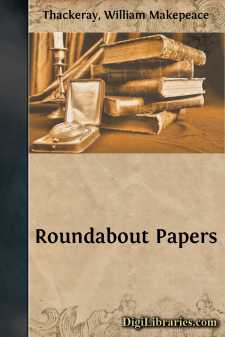Categories
- Antiques & Collectibles 13
- Architecture 36
- Art 48
- Bibles 22
- Biography & Autobiography 813
- Body, Mind & Spirit 142
- Business & Economics 28
- Children's Books 17
- Children's Fiction 14
- Computers 4
- Cooking 94
- Crafts & Hobbies 4
- Drama 346
- Education 46
- Family & Relationships 57
- Fiction 11829
- Games 19
- Gardening 17
- Health & Fitness 34
- History 1377
- House & Home 1
- Humor 147
- Juvenile Fiction 1873
- Juvenile Nonfiction 202
- Language Arts & Disciplines 88
- Law 16
- Literary Collections 686
- Literary Criticism 179
- Mathematics 13
- Medical 41
- Music 40
- Nature 179
- Non-Classifiable 1768
- Performing Arts 7
- Periodicals 1453
- Philosophy 64
- Photography 2
- Poetry 896
- Political Science 203
- Psychology 42
- Reference 154
- Religion 513
- Science 126
- Self-Help 84
- Social Science 81
- Sports & Recreation 34
- Study Aids 3
- Technology & Engineering 59
- Transportation 23
- Travel 463
- True Crime 29
William Makepeace Thackeray
William Makepeace Thackeray was an English novelist and satirist, best known for his novel "Vanity Fair," which offers a scathing critique of early 19th-century British society. Born on July 18, 1811, in Calcutta, India, Thackeray's works often explored themes of social climbing and hypocrisy. His wit and keen observations made him one of the leading literary figures of the Victorian era.
Author's Books:
Sort by:
CHAPTER I. In which one of the Virginians visits home On the library wall of one of the most famous writers of America, there hang two crossed swords, which his relatives wore in the great War of Independence. The one sword was gallantly drawn in the service of the king, the other was the weapon of a brave and honoured republican soldier. The possessor of the harmless trophy has earned for himself a...
more...
CHAPTER I. RELATES TO MR. HARRY FOKER'S AFFAIRS. Since that fatal but delightful night in Grosvenor place, Mr. Harry Foker's heart had been in such a state of agitation as you would hardly have thought so great a philosopher could endure. When we remember what good advice he had given to Pen in former days, how an early wisdom and knowledge of the world had manifested itself in the gifted...
more...
Mr. and Mrs. Fitzroy Timmins live in Lilliput Street, that neat little street which runs at right angles with the Park and Brobdingnag Gardens. It is a very genteel neighborhood, and I need not say they are of a good family. Especially Mrs. Timmins, as her mamma is always telling Mr. T. They are Suffolk people, and distantly related to the Right honorable the Earl of Bungay. Besides his house in...
more...
THE WOLVES AND THE LAMB. ACT I. Scene.—MILLIKEN'S villa at Richmond; two drawing-rooms opening into one another. The late MRS. MILLIKEN'S portrait over the mantel-piece; bookcases, writing-tables, piano, newspapers, a handsomely furnished saloon. The back-room opens, with very large windows, on the lawn and pleasure-ground; gate, and wall—over which the heads of a cab and a carriage are...
more...
I do not know where Ballymulligan is, and never knew anybody who did. Once I asked the Mulligan the question, when that chieftain assumed a look of dignity so ferocious, and spoke of "Saxon curiawsitee" in a tone of such evident displeasure, that, as after all it can matter very little to me whereabouts lies the Celtic principality in question, I have never pressed the inquiry any farther. I...
more...
In the Morning of Life the Truthful wooed the Beautiful, and their offspring was Love. Like his Divine parents, He is eternal. He has his Mother's ravishing smile; his Father's steadfast eyes. He rises every day, fresh and glorious as the untired Sun-God. He is Eros, the ever young. Dark, dark were this world of ours had either Divinity left it—dark without the day-beams of the Latonian...
more...
THE CHRONICLE OF THE DRUM. PART I. At Paris, hard by the Maine barriers,Whoever will choose to repair,Midst a dozen of wooden-legged warriorsMay haply fall in with old Pierre.On the sunshiny bench of a tavernHe sits and he prates of old wars,And moistens his pipe of tobaccoWith a drink that is named after Mars. The beer makes his tongue run the quicker,And as long as his tap never fails,Thus over his...
more...
ON A LAZY IDLE BOY. I had occasion to pass a week in the autumn in the little old town of Coire or Chur, in the Grisons, where lies buried that very ancient British king, saint, and martyr, Lucius,* who founded the Church of St. Peter, on Cornhill. Few people note the church now-a-days, and fewer ever heard of the saint. In the cathedral at Chur, his statue appears surrounded by other sainted persons...
more...
We, who can recall the consulship of Plancus, and quite respectable, old-fogyfied times, remember amongst other amusements which we had as children the pictures at which we were permitted to look. There was Boydell's Shakspeare, black and ghastly gallery of murky Opies, glum Northcotes, straddling Fuselis! there were Lear, Oberon, Hamlet, with starting muscles, rolling eyeballs, and long pointing...
more...
BEFORE THE CURTAIN As the manager of the Performance sits before the curtain on the boards and looks into the Fair, a feeling of profound melancholy comes over him in his survey of the bustling place. There is a great quantity of eating and drinking, making love and jilting, laughing and the contrary, smoking, cheating, fighting, dancing and fiddling; there are bullies pushing about, bucks ogling the...
more...











